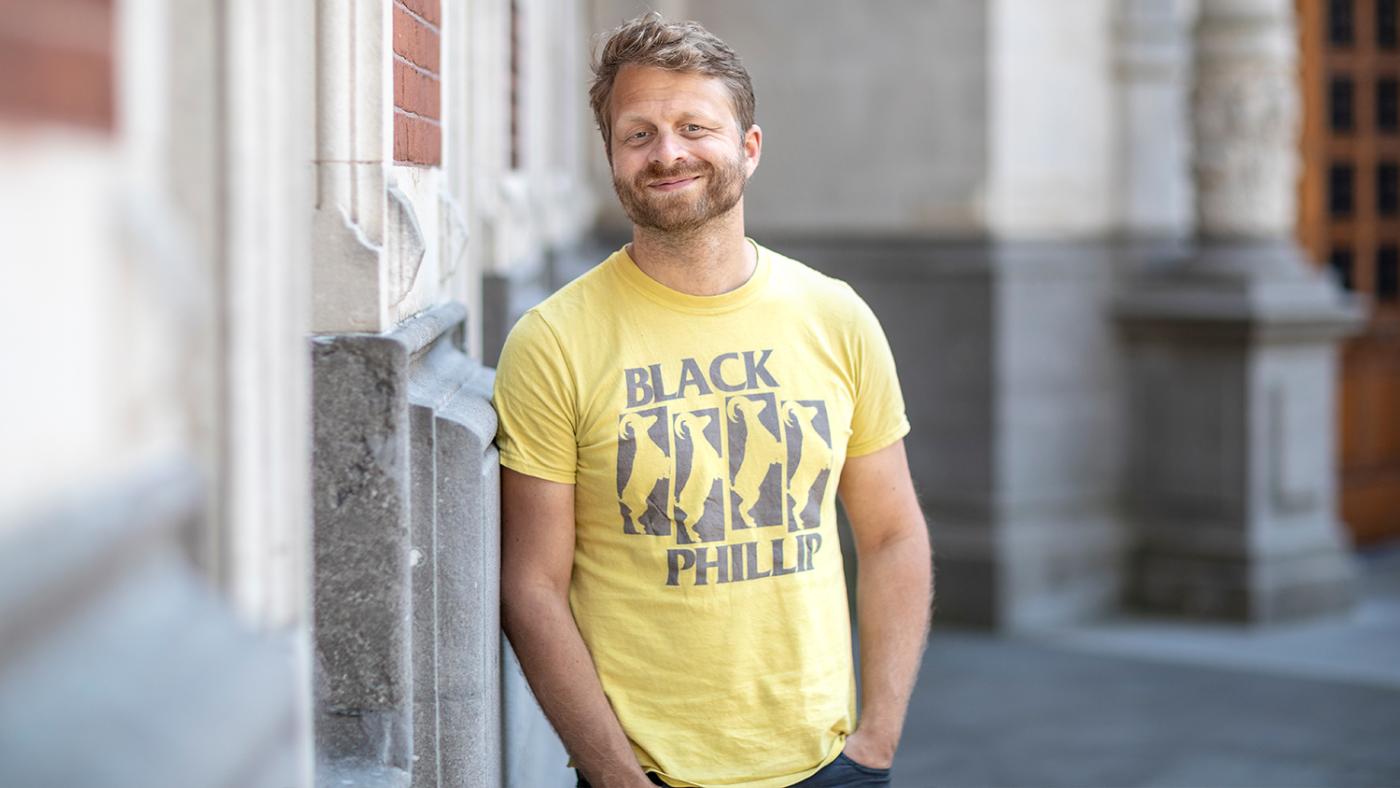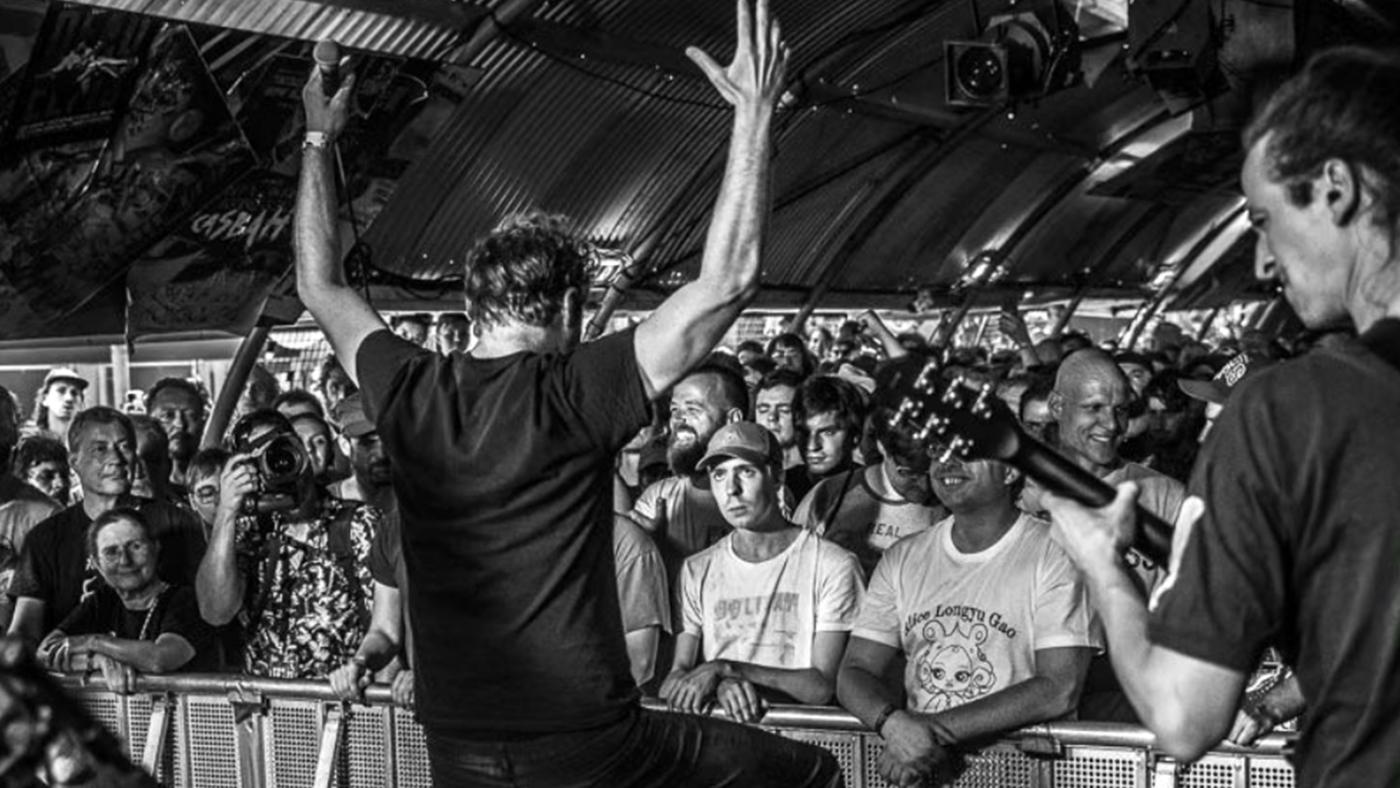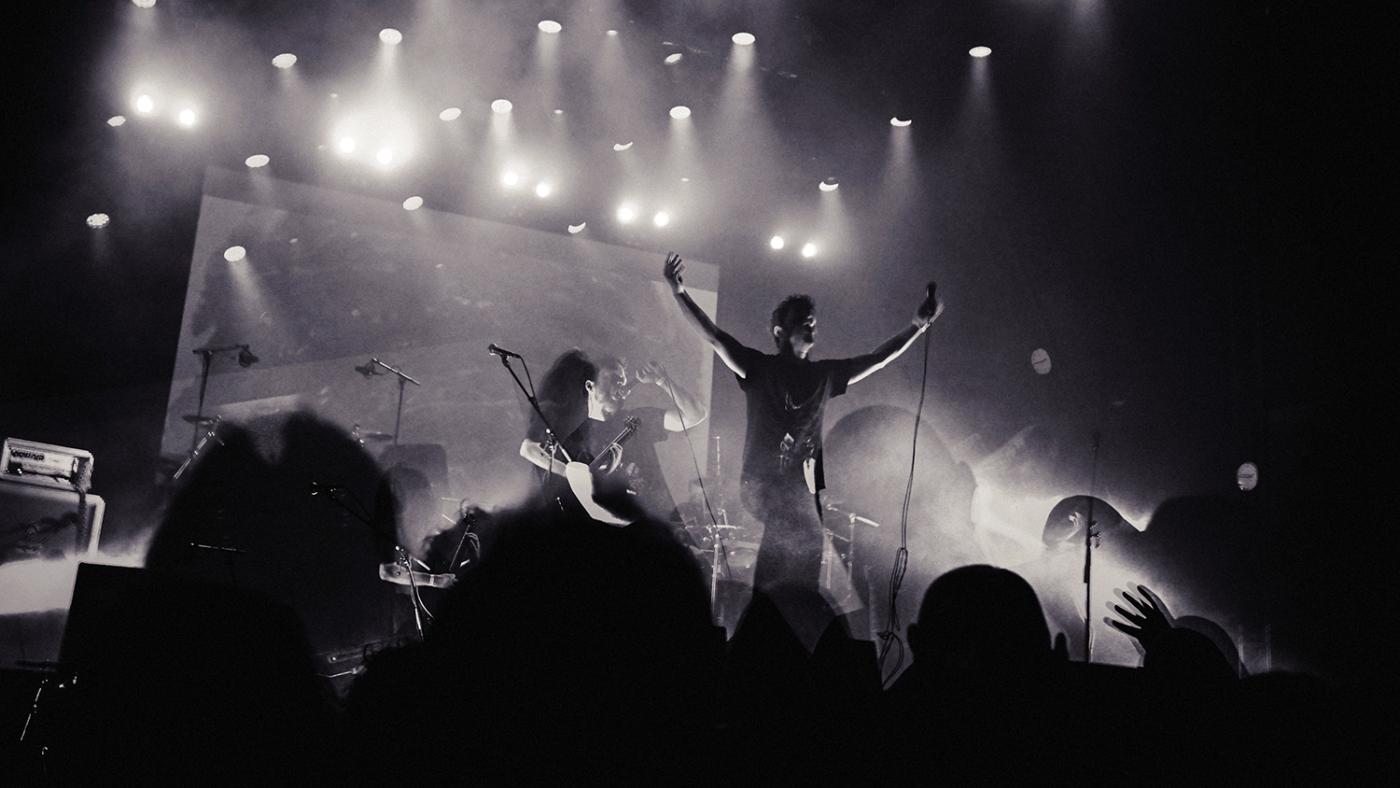‘They thought someone was dying’
UU scientist sings his lungs out in black metal band

There is no doubt that we're entering a musician's home. There are guitars hanging on the wall, vinyl records in the cupboard and a large screen connected to studio monitors and a professional microphone. "That's a great microphone, by the way," says Joost Vervoort, who records songs at home for his own band and others. Like the other day, when a friend stopped by to record a metal album — something that didn't go unnoticed by the neighbours. The entire neighbourhood gathered outside his window because they thought someone was dying. After that, Joost was added to the neighbourhood's WhatsApp group.
Vervoort is an associate professor at the Copernicus Institute of Sustainable Development and a member of the Utrecht Young Academy, an interdisciplinary group comprised of young UU researchers. He also collects many other titles and positions, such as research leader at the University of Oxford and visiting fellow at the Research Institute for Humanity and Nature, in Kyoto. With a CV like that, one could assume he would have no time left for singing in the black metal band Terzij de Horde (Apart from the horde, Ed.). Last summer, his band played at the festivals Best Kept Secret and Into the Great Wide Open, which are not known for featuring metal bands. Theirs was chosen as the sixth-best album of 2022 by the Dutch newspaper NRC.

Terzij de Horde performing at Best Kept Secret. Photo: Paul Verhagen
When did you start singing?
“I started singing in hardcore punk bands just to try it. At first, I overexerted my voice a lot. I had my first rehearsal with Terzij de Horde the night before the job interview for my PhD. My voice was practically gone but I explained to them that I'd sung way too enthusiastically the night before. One of the supervisors was into metal, so they liked it.”
How is it to combine a music career with a position at the Copernicus Institute?
“At Copernicus, I focus on the future: thinking about future scenarios, creative practices, and politics. I am an ecologist by training but I occupy myself with societal dynamics, including game design. I’m currently working on a video game in which you get to drag people to court in climate lawsuits."
What exactly do you do for that video game?
“I was the one who came up with the idea for the game. Officially, I’m a 'director of scientific impact,' so I'm tasked with thinking about how this idea can be connected to real social issues. Gaming is a bigger industry than film and music combined, so, when it comes to change, there’s a lot of power in gaming."
Both of Vervoort's roles aim to safeguard a better world or at least protect it from worsening. The climate inspired some of the band's songs, for example. Their latest album includes a list of readings that inspired the lyrics. He explains that what he likes the most about the kind of music he plays is its "primal energy". Vervoort: “Black metal is almost meditative as it has endless ongoing rhythms. There is something mystical, something ritual about it.” And this aspect has everything to do with his scientific work.
“My research is partly about such interaction rituals. One of the PhD candidates that I supervise, Carien Moossdorff, suggested a theory by the sociologist Randall Collins which argues that social change happens through interaction rituals. So, whenever people come together with a shared identity and focus, an emotional energy is created that gives people a heightened sense of enthusiasm, togetherness, and autonomy. That’s what you feel when you're part of the Extinction Rebellion activists blocking the A12 motorway, for example. This phenomenon can be examined as a basis for change. People are attracted to that kind of emotional energy, so they’re captivated by successful interaction rituals."
“Utrecht has a big black metal scene, with many bands identifying as left-wing. People come together and something happens there. I don’t want to make it too utopian but these elements are present in the events of the black metal community as well.”
The emotional aspect of black metal seems to be at odds with a scientific perspective, when you are proclaiming the same message. You can compose a metal album using the same reading list you'd use to write a scientific paper. Do you think one is more appropriate than the other?
“I think black metal is less about bringing across a message and more about providing emotional energy, and subsequently framing that energy with a certain meaning. It can help people to reflect on how they should interpret the feeling the music is giving them.
In my opinion, we need to look at how academics can connect their ideas to their emotions and those of others, as well as consider the energy people get from certain ideas. Where is the anger when scientists express themselves about their problems, for example? In the context of climate, this is more and more common. At the A12 blockade, we've been seeing scientists expressing anger, sadness, and fear. I think that's really valuable.
Of course, scientists should also have enough of an open mind to not only approach a topic from their emotions. At the same time, it is important to realise that a lack of emotions is an emotional position as well.”

Terzij de Horde performing at Roadburn. Photo: Void Revelations
"Contrast is cool"
Vervoort loves contrasts, so much so that Terzij de Horde wrote two songs based on poems by Hendrik Marsman, a poet from the early 20th century. They performed the songs at a literature festival, a setting used to calm readings. “It was really well-received. It was crowded, people were queuing. I think a lot of people thought: 'Wow, this is a really different energy.'"
“Last week, I also did a ‘metal scream’ at the International Sustainability Transitions Conference, in Utrecht. My colleagues made a song about transitions and we pretended that I was a volunteer who had joined the conference spontaneously. I was hooked up to a heart monitor and my heartbeat became the beat of the song. Then, I suddenly grabbed the microphone and started screaming my lungs out.” The link between science, music and emotion doesn’t get more obvious than that.
But one would be mistaken to assume that Vervoort's projects end there. During Covid, he started a meditation group which now gathers about fifty people who sometimes meditate at his place, all under the watchful eye of the figure in the painting displayed on an easel across the room. He painted it himself for the album cover of a friend's band. Yes, he does that too.